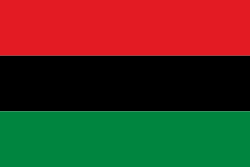African socialism
| Part of the Politics series on |
| Pan-African Topics |
|---|
 |
|
People
|
|
African socialism is a belief in sharing economic resources in a "traditional" African way, as distinct from classical socialism. Many African politicians of the 1950s and 1960s professed their support for African socialism, although definitions and interpretations of this term varied considerably. This is because African socialism has not been the product of one single thinker. One example of a definition of African socialism was phrased as a metaphor by de Graft Johnson, from the University of Ghana, in 1962: the African extended-family system writ large.[1]
Origins and themes
As many African countries gained independence during the 1960s, some of these newly formed governments rejected the ideas of capitalism in favour of a more afrocentric economic model. Advocates of African socialism claimed that it was not the opposite of capitalism nor a response to it, but something completely different.
Julius Nyerere of Tanzania, Modibo Keita of Mali, Léopold Senghor of Senegal, Kwame Nkrumah of Ghana and Sékou Touré of Guinea, were the main architects of African Socialism according to William H. Friedland and Carl G. Rosberg Jr. editors of the book "African Socialism."[2]
Common principles of various versions of African socialism were: social development guided by a large public sector, incorporating the African identity and what it means to be African, and the avoidance of the development of social classes within society.[3] Senghor claimed that "Africa’s social background of tribal community life not only makes socialism natural to Africa but excludes the validity of the theory of class struggle," thus making African socialism, in all of its variations, different from Marxism and European socialist theory .[4]
Ujamaa
The Concept or politic ideology of Ujamaa formed the basis of Julius Nyerere's social and economic development policies in Tanzania after Tanganyika gained independence from its colonial power Britain in 1961 and its union with Zanzibar to form Tanzania in 1964. The word Ujamaa comes from the Swahili word for extended family or familyhood and is distinguished by several key characteristics, namely that a person becomes a person through the people or community.
In 1967, President Nyerere published his development blueprint, which was titled the Arusha Declaration, in which Nyerere pointed out the need for an African model of development. That formed the basis of African socialism for Tanzania.[5] The Arusha Declaration sparked international discussions and debates about African socialism in the academic and economic world.[5]
However, according to the BBC, "while he united his nation and made major advances in the fields of health and education," Julius Nyerere's African socialist "Ujamaa" collectives "proved disastrous for Tanzania's economy".[6]
See also
- Third Worldism
- Pan-Africanism
- Arab socialism
- Melanesian socialism
- Ubuntu
- Ujamaa
- Harambee
- Third International Theory
Notes
- ↑ Brockway, Fenner (1963). African Socialism. London: The Bodley Head. p. 25. "[T]he principle of the State as a father, which is the basis of socialism, is what we have here in our clans or tribes which are in fact extended families. In our society, the collective wealth of the extended family is used for the welfare of the family as a whole. The extended families take on the functions of social insurance, and if a member of the family falls into debt, all the others help him to pay it; if he is ill, they look after him; if there is a bright boy in the family whom the immediate parents cannot afford to educate, the others help in educating him. Property, especially land, often belongs to the whole extended family. There are abuses in the extended family system, but its basic pattern, when enlarged to embrace the state, is virtually what is meant by socialism."
- ↑ Friedland and Rosberg Jr., William and Carl (1964). African Socialism. California: Stanford University Press. p. 3.
- ↑ Friedland and Rosberg Jr., William and Carl (1964). African Socialism. California: Stanford University Press. pp. 3–5.
- ↑ Brockway, Fenner (1963). African Socialism. London: The Bodley Head. p. 32.
- 1 2 Mwansasu and Pratt, Bismark and Cranford (1979). Towards Socialism in Tanzania. Toronto: University of Toronto Press. p. 3.
- ↑ "Tributes pour in for Nyerere". BBC News. 1999-10-14. Retrieved 2009-01-11.
References
- Bismarck U. Mwansasu and Cranford Pratt, Towards Socialism in Tanzania, University of Toronto Press, Toronto, 1979.
- Fenner Brockway, African Socialism, The Bodley Head, London, 1963.
- Ghita Jonescu and Ernest Gellner, Populism, Weidenfeld and Nicholson, London, 1969.
- Paolo Andreocci, Democrazia, partito unico e populismo nel pensiero politico africano, in Africa, Rome, n. 2-3, 1969.
- Peter Worsley, The Third World,Weidenfeld and Nicholson, London, 1964.
- William H. Crawford and Carl G.Rosberg jr., African Socialism, Stanford University press, California, 1964.
- Yves Bénot, Idélogies des Indepéndances africaines, F.Maspero, Paris, 1969.
